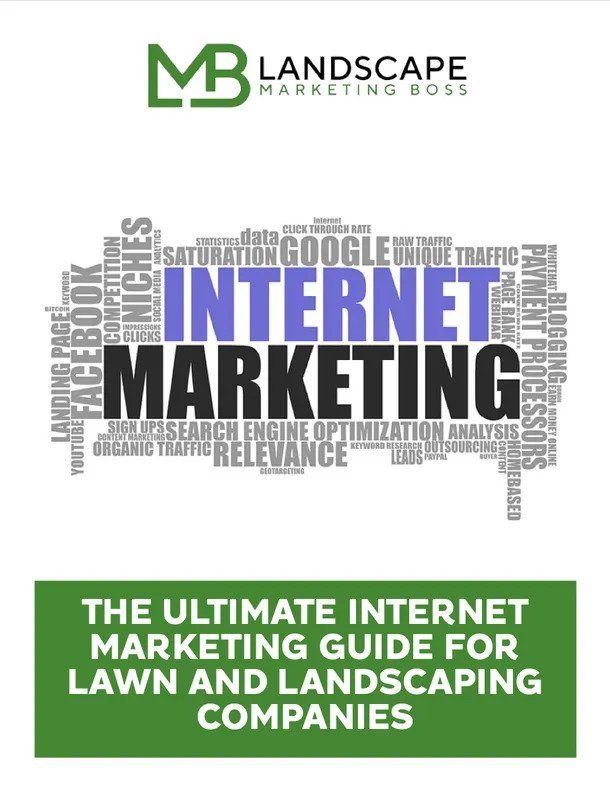"Unlock the Secrets to Explosive Growth for Your Business with These 11 Landscaping Marketing Strategies!"
The Ultimate Guide to Landscaping Marketing Strategies

Introduction to the Baddest Marketing Strategies for Landscaping Companies
In the competitive world of landscaping, standing out from the crowd can be a daunting task. This article aims to equip landscaping business owners with actionable and proven Landscaping marketing strategies.
Understanding Your Target Market for a Landscaping Business
To effectively market your landscaping business, it's essential to have a deep understanding of your target market. Knowing who your ideal customers are and what they want can help you tailor your marketing efforts to meet their specific needs, leading to higher customer satisfaction and increased sales.
Identifying Your Ideal Customer
Start by defining your ideal customer profile. Consider factors such as age, gender, income level, and lifestyle. For instance, are you targeting busy professionals who need low-maintenance yards, or families who want safe, kid-friendly outdoor spaces? The more specific you can be, the better you can tailor your marketing messages to resonate with your audience.
Analyzing Customer Demographics and Preferences
Gather data on the demographics of your current and potential customers. Tools like Google Analytics, social media insights, and customer surveys can provide valuable information on your audience's age, location, interests, and behavior. Understanding these demographics will help you create targeted marketing campaigns that speak directly to your audience's preferences and needs.
Understanding Local Market Demands and Trends
Landscaping needs can vary greatly depending on geographic location. Research local market demands and trends to understand what potential customers in your area are looking for. Are they interested in drought-resistant plants, sustainable landscaping practices, or modern outdoor living spaces? Staying informed about local trends can help you offer services that are in high demand.
Creating Customer Personas
Develop detailed customer personas based on your research. These personas should include demographic information, pain points, and buying behaviors. By creating personas, you can humanize your target market and better understand their motivations and challenges.
Tailoring Your Marketing Efforts
Once you know your target market, you can tailor your marketing efforts to appeal to them. Use the language and imagery that resonate with your audience in your marketing materials. Highlight the benefits of your services that align with their needs and desires. For instance, if your target market values sustainability, emphasize your eco-friendly practices and products.
Engaging with Your Audience
Engagement is key to building strong relationships with your customers. Use social media, email newsletters, and other communication channels to interact with your audience. Ask for feedback, respond to comments and messages, and show that you value their input.

Building a Strong Brand for your Lawn & Landscaping Business
A strong brand is the cornerstone of any successful business, and the landscaping industry is no exception. Your brand represents your business's identity, values, and promise to your customers. It's what sets you apart from competitors and creates a lasting impression in the minds of your clients. Here’s how you can build a compelling and strong brand for your landscaping business.
Importance of a Unique Selling Proposition (USP)
Your Unique Selling Proposition (USP) is what differentiates your landscaping business from the rest. It’s the unique benefit or feature that only your business offers. Is it your exceptional customer service, innovative design, sustainable practices, or perhaps your competitive pricing? Clearly articulate your USP and make it the focal point of your branding and marketing efforts.
Creating a Memorable Business Name and Logo
Your business name and logo are often the first things potential customers will notice about your brand. Choose a name that is easy to remember, reflects the essence of your business, and resonates with your target market. Your logo should be visually appealing and professional, incorporating elements that reflect the nature of your landscaping services.
Establishing Brand Consistency Across All Marketing Channels
Consistency is key to building a strong brand. Ensure that your brand’s visual elements, messaging, and tone of voice are consistent across all marketing channels, including your website, social media, printed materials, and advertisements.
Delivering Exceptional Customer Experiences
A strong brand is built on positive customer experiences. Ensure that every interaction with your customers reflects your brand’s values and promises. From the initial consultation to the completion of a project, provide exceptional service that exceeds customer expectations. Happy customers will refer you to friends and family.
Leveraging Customer Testimonials and Case Studies
Customer testimonials and case studies are powerful tools for building credibility and trust in your brand. Showcase the positive experiences of your satisfied customers on your website, social media, and marketing materials. Detailed case studies that highlight your successful projects and the value you provided can help potential customers see the benefits of choosing your landscaping services.
Creating a Strong Online Presence
In today’s digital age, having a strong online presence is crucial for building your brand. Invest in a professional, user-friendly website that showcases your services, portfolio, and customer testimonials. Optimize your website for search engines to increase visibility. Use social media platforms to engage with your audience, share valuable content, and build a community around your brand.
Engaging in Community and Environmental Initiatives
Demonstrating your commitment to the community and environment can enhance your brand’s reputation. Participate in local events, sponsor community activities, and engage in sustainable landscaping practices.

Developing a Professional Landscapers Website
A professional website is essential for any landscaping business aiming to attract and retain customers. It serves as the digital face of your company, providing potential clients with a first impression of your services and expertise. Here’s a comprehensive guide to developing an effective and professional website for your landscaping business.
Key Elements of a Landscaping Business Website
A well-designed website should be informative, visually appealing, and easy to navigate. Here are the essential elements to include:
- Homepage: The homepage should provide a clear overview of your services and what sets your business apart. Include a strong headline, a brief description of your services, and a compelling call-to-action (CTA) to guide visitors to other parts of your site.
- Services Page: Detail the services you offer, such as lawn care, garden design, hardscaping, irrigation, and maintenance. Use high-quality images and descriptions to illustrate your work.
- Portfolio: Showcase your previous projects with before-and-after photos. Highlight a variety of projects to demonstrate your versatility and expertise.
- About Us: Share your company’s story, mission, values, and team. Personalize this section to build trust and connect with your audience.
- Testimonials: Include customer reviews and testimonials to build credibility and showcase your success stories.
- Contact Information: Make it easy for potential clients to reach you. Include your phone number, email address, physical address, and a contact form.
Search Engine Optimization (SEO) for Landscapers
Search Engine Optimization (SEO) is a critical component of any successful digital marketing strategy. For landscaping businesses, SEO helps improve your website’s visibility on search engines like Google, making it easier for potential clients to find your services. By optimizing your website for relevant keywords and providing valuable content, you can attract more organic traffic, generate leads, and grow your business. Here’s how to effectively implement SEO for your landscaping business.
Basics of SEO for Landscaping Businesses
SEO involves a range of techniques and practices designed to enhance your website’s ranking on search engine results pages (SERPs). These techniques can be broadly categorized into on-page SEO, off-page SEO, and technical SEO.
- On-page SEO: This focuses on optimizing elements on your website, such as content, keywords, and meta tags.
- Off-page SEO: This involves activities outside your website that can impact your rankings, such as backlinks and social media engagement.
- Technical SEO: This addresses the backend aspects of your website, such as site speed, mobile-friendliness, and site architecture.
Keyword Research Specific to Landscaping
- Keyword research is the foundation of effective SEO. It involves identifying the search terms that potential customers use when looking for landscaping services.
On-Page SEO Techniques
- On-page SEO involves optimizing individual pages on your website to rank higher and earn more relevant traffic.
Local SEO Strategies
Local SEO is crucial for landscaping businesses as most of your clients will be from your local area. Here’s how to optimize your website for local search:
- Google My Business: Create and optimize your Google My Business profile. Ensure your business name, address, and phone number (NAP) are consistent across all online platforms.
- Local Citations: List your business on local directories and citation sites such as Yelp, Angie’s List, and HomeAdvisor.
- Local Keywords: Use location-based keywords (e.g., “landscaping services in [city]”) throughout your website and content.
- Customer Reviews: Encourage satisfied customers to leave positive reviews on Google and other review sites. Respond to reviews to show engagement and build trust.
Off-Page SEO Techniques
Off-page SEO involves building your website’s authority and reputation through external activities. Key off-page SEO techniques include:
- Backlink Building: Earn backlinks from reputable websites. You can achieve this by creating high-quality content, guest blogging, and reaching out to industry influencers.
- Social Media Engagement: Share your content on social media platforms to increase visibility and drive traffic to your website.
- Online Partnerships: Collaborate with local businesses and organizations to gain backlinks and boost your online presence.
Technical SEO
Technical SEO focuses on the technical aspects of your website to ensure it is properly indexed and ranked by search engines. Key technical SEO considerations include:
- Site Speed: Optimize your website’s loading speed by compressing images, minimizing code, and using caching.
- Mobile-Friendliness: Ensure your website is responsive and provides a good user experience on all devices.
- Secure Website: Use HTTPS to secure your website and protect user data.
- XML Sitemap: Create and submit an XML sitemap to help search engines crawl and index your website.
- Structured Data: Implement schema markup to help search engines understand your content and enhance your SERP appearance with rich snippets.
Monitoring and Analytics
Continuous monitoring and analysis are essential to measure the effectiveness of your SEO efforts. Use tools like Google Analytics and Google Search Console to track your website’s performance, monitor keyword rankings, and identify areas for improvement.

Leveraging Social Media for your Landscaping Company
Social media is a powerful tool for landscaping businesses to connect with potential clients, showcase their work, and build a loyal customer base. Here’s how to make the most of social media for your landscaping business.
Choosing the Right Social Media Platforms
Not all social media platforms are created equal, and different platforms cater to different audiences and types of content. Here are some key platforms to consider for your landscaping business:
- Facebook: Ideal for reaching a broad audience, sharing updates, photos, and engaging with customers through comments and messages.
- Instagram: Perfect for visually showcasing your landscaping projects with high-quality photos and short videos. Use Instagram Stories and Reels for behind-the-scenes content and quick tips.
- Pinterest: Great for sharing landscaping ideas, inspiration, and design trends. Create boards to organize your content and attract homeowners looking for ideas.
- LinkedIn: Useful for networking with other professionals, building partnerships, and sharing industry insights.
Creating Engaging and Visually Appealing Content
- Visual content is crucial for a landscaping business. High-quality images and videos can effectively showcase your work and attract potential clients.
Utilizing Facebook and Instagram Ads
- Paid advertising on social media can help you reach a wider audience and generate more leads.
Building a Community and Engaging with Followers
- Social media is not just about broadcasting your message; it’s also about building relationships with your audience.
Analyzing and Optimizing Your Social Media Strategy
Regularly analyze your social media performance to understand what’s working and what’s not. Use insights and analytics tools provided by the platforms to track key metrics such as engagement, reach, and conversions. Here’s how to optimize your strategy:
- Content Performance: Identify which types of content perform best and create more of what your audience likes.
- Posting Schedule: Determine the best times to post based on when your audience is most active. Consistency is key, so create a content calendar to plan and schedule your posts.
- Adjusting Strategies: Based on your analysis, adjust your strategies to improve results. Experiment with new content formats, ad campaigns, and engagement tactics.
Collaborating with Influencers and Local Businesses
Partnering with influencers and local businesses can expand your reach and enhance your credibility. Here’s how to collaborate effectively:
- Influencer Partnerships: Identify local influencers who align with your brand and have a following that matches your target market. Collaborate on projects, giveaways, or sponsored posts.
- Local Business Collaborations: Partner with related local businesses, such as garden centers, home improvement stores, or real estate agents. Cross-promote each other’s services and refer clients.

Content Marketing for a Lawn & Landscaping Company
Content marketing is a strategic approach focused on creating and distributing valuable, relevant, and consistent content to attract and retain a clearly defined audience—and, ultimately, to drive profitable customer action. For landscaping businesses, content marketing can help establish your expertise, build trust with potential clients, and generate more leads. Here’s how to develop and implement an effective content marketing strategy for your landscaping business.
Importance of Blogging and Content Creation
Blogging and content creation are at the heart of content marketing. By regularly publishing informative and engaging content, you can address your audience's pain points, answer their questions, and position your business as a go-to resource for landscaping knowledge.
- Educational Content: Provide tips on lawn care, gardening, landscape design, and maintenance. Educational content helps your audience solve their problems and improves their landscaping knowledge.
- Inspirational Content: Share ideas and inspiration for beautiful landscapes, seasonal planting, and outdoor living spaces. Use high-quality images and detailed descriptions to inspire your audience.
- Project Showcases: Highlight your completed projects with before-and-after photos, detailed descriptions, and testimonials from satisfied clients. This not only showcases your expertise but also provides social proof of your work’s quality.
Topic Ideas Relevant to Landscaping
Generating fresh and relevant content ideas can sometimes be challenging. Here are some topic ideas tailored to the landscaping industry:
- Seasonal Tips: Share tips for preparing gardens for spring, summer, fall, and winter. Discuss seasonal maintenance tasks and plant care.
- DIY Projects: Offer step-by-step guides for simple DIY landscaping projects, such as building a raised garden bed, creating a compost bin, or installing a garden path.
- Plant Profiles: Write detailed profiles of popular plants, including care instructions, ideal growing conditions, and landscaping uses.
- Design Trends: Discuss the latest trends in landscape design, such as sustainable landscaping, native plants, and outdoor living spaces.
- Problem Solving: Address common landscaping problems, such as pest control, weed management, and soil improvement, and offer practical solutions.
- Client Stories: Feature stories from your clients about their landscaping journeys and how your services helped them achieve their goals.
Incorporating SEO into Content Marketing
- To maximize the reach and impact of your content, it’s essential to incorporate SEO best practices.
Sharing Content Across Various Platforms
To reach a broader audience, share your content across multiple platforms. This not only increases your visibility but also drives more traffic to your website.
- Social Media: Share your blog posts, videos, and infographics on social media platforms like Facebook, Instagram, Twitter, and Pinterest. Use engaging captions and visuals to attract attention.
- Email Newsletters: Include your latest content in your email newsletters. Provide a brief summary and a link to the full article to drive traffic back to your website.
- Online Communities: Participate in online communities and forums related to landscaping and gardening. Share your content when it’s relevant to the discussion and can provide value to the community members.
- Guest Blogging: Write guest posts for other industry blogs or websites. This can help you reach a new audience and build backlinks to your website, improving your SEO.
Utilizing Video Content
Video content is highly engaging and can effectively showcase your landscaping expertise. Here are some video content ideas:
- How-To Videos: Create instructional videos demonstrating how to perform various landscaping tasks, such as planting trees, installing irrigation systems, or building garden features.
- Project Tours: Film tours of your completed projects, highlighting the design elements and explaining the process.
- Customer Testimonials: Record video testimonials from satisfied clients to build trust and credibility.
- Live Streams: Host live Q&A sessions or workshops on social media platforms to engage with your audience in real-time and answer their questions.
Measuring Content Marketing Success
To make sure your content marketing efforts are effective, regularly measure and analyze your results. Use tools like Google Analytics, social media insights, and SEO software to track key metrics such as:
- Website Traffic: Monitor the amount of traffic your content drives to your website. Look at metrics like page views, unique visitors, and average time on page.
- Engagement: Measure how your audience interacts with your content. Track metrics like social shares, comments, and likes.
- Lead Generation: Evaluate how many leads your content generates. Track form submissions, newsletter sign-ups, and other conversions.
- SEO Performance: Monitor your content’s search engine rankings and organic traffic. Track keyword rankings and the number of backlinks to your content.
Email Marketing for your Landscaping Business
Email marketing is a powerful and cost-effective way for landscaping businesses to connect with potential and existing clients, promote services, and drive customer engagement. By delivering valuable content directly to your audience’s inbox, you can build strong relationships, increase brand loyalty, and generate leads.
Building an Email List
- A successful email marketing campaign starts with a high-quality email list. Emails can be gathered with website sign up forms, lead magnets, social media and offline collection methods.
Crafting Effective Email Campaigns
- Creating engaging and effective email campaigns involves understanding your audience’s needs and delivering content that resonates with them.
Segmenting Your Audience
- Segmentation involves dividing your email list into smaller groups based on specific criteria, allowing you to send more targeted and relevant emails.
Using Newsletters to Keep Customers Informed and Engaged
- Regular newsletters are also a great way to keep your audience engaged and informed about your landscaping business.

Pay-Per-Click (PPC) Advertising for Landscaping Companies
Pay-Per-Click (PPC) advertising is a powerful tool for landscaping businesses looking to generate immediate leads and increase online visibility. With PPC, you can create targeted ads that appear on search engines and social media platforms, reaching potential clients who are actively searching for landscaping services.
Overview of PPC Advertising
PPC advertising allows you to bid on keywords relevant to your business, and you pay a fee each time someone clicks on your ad. This model ensures that you only pay for actual traffic to your website. The most popular PPC platform is Google Ads, but other platforms like Bing Ads and social media networks such as Facebook and Instagram also offer PPC options.
Online Reviews and Reputation Management
Online reviews and reputation management are critical components of your landscaping business's marketing strategy.
Importance of Online Reviews for Landscaping Businesses
Online reviews play a crucial role in influencing potential customers' decisions. Here's why they matter:
- Building Trust: Positive reviews act as social proof, building trust with potential clients by showcasing the experiences of satisfied customers.
- Improving SEO: Search engines consider reviews when ranking local businesses. More positive reviews can improve your local SEO, making it easier for potential clients to find you.
- Driving Conversions: Prospective customers often read reviews before making a decision. Positive feedback can be the deciding factor that converts a lead into a client.
- Providing Insights: Reviews offer valuable insights into what your customers appreciate about your services and where there might be room for improvement.
Encouraging Satisfied Customers to Leave Reviews
Actively encouraging happy clients to leave reviews can help you build a robust online reputation. Here’s how to do it:
- Ask Directly: After completing a project, ask satisfied customers if they would be willing to leave a review. A personal request can be very effective.
- Follow-Up Emails: Send a follow-up email thanking customers for their business and including a direct link to your review profiles on Google, Yelp, Facebook, or other relevant platforms.
- Incentives: Consider offering a small incentive, such as a discount on future services or a free consultation, to encourage customers to leave a review.
- Make It Easy: Provide clear instructions on how to leave a review and links to your review profiles. The easier it is, the more likely customers are to follow through.
Responding to Reviews
Responding to reviews, both positive and negative, shows that you value customer feedback and are committed to excellent service. Here’s how to handle different types of reviews:
- Positive Reviews: Thank the reviewer for their feedback, mention specific details from their review, and express your appreciation for their business. This encourages more positive reviews and reinforces good relationships.
- Negative Reviews: Address negative reviews promptly and professionally. Acknowledge the issue, apologize if necessary, and offer a solution or to discuss the matter offline. Avoid defensive or argumentative responses, as they can further damage your reputation.
Monitoring and Managing Your Online Reputation
Regularly monitoring your online reputation helps you stay on top of what customers are saying and allows you to respond promptly. Here’s how to manage your online reputation effectively:
- Review Monitoring Tools: Use tools like Google Alerts, Yelp for Business, and social media monitoring tools to track mentions of your business across various platforms.
- Consistent Review Checks: Regularly check your profiles on Google, Yelp, Facebook, and other relevant review sites to ensure you’re aware of new reviews.
- Reputation Management Services: Consider using reputation management services that offer comprehensive monitoring and can help manage your online presence.
Using Reviews to Improve Your Services
Feedback from reviews can provide valuable insights into your business's strengths and areas for improvement. Here’s how to use reviews constructively:
- Identify Trends: Look for common themes in reviews. Are there recurring compliments about a particular service or consistent complaints about a specific issue? Use this information to improve your services.
- Customer Feedback: Use positive reviews to reinforce what you’re doing well and negative reviews to identify areas that need attention.
- Training and Development: Share feedback with your team and use it for training and development. Recognize and reward employees who receive positive mentions and address any issues that need improvement.
Showcasing Reviews and Testimonials
Promote your positive reviews and testimonials to build trust and attract new clients. Here’s how to showcase them effectively:
- Website: Create a dedicated testimonials page on your website and feature snippets of positive reviews on your homepage, service pages, and contact page.
- Social Media: Share positive reviews and testimonials on your social media profiles. Use engaging visuals and tag the customer (with their permission) to increase authenticity.
- Marketing Materials: Include quotes from positive reviews in your brochures, flyers, and other marketing materials to provide social proof.
Addressing Fake or Unfair Reviews
Sometimes businesses encounter fake or unfair reviews. Here’s how to handle them:
- Identify the Issue: Determine whether the review is genuinely unfair or fake. Look for signs such as generic language, no specific details, or reviews from people who are not your customers.
- Report the Review: Most review platforms allow you to report fake or inappropriate reviews. Follow the platform’s guidelines for reporting and provide any necessary evidence.
- Respond Professionally: If the review is unfair but not fake, respond professionally. Acknowledge the reviewer’s feelings and offer to discuss the issue privately to resolve it.

Networking and Referrals for Landscaping Business
Networking and referrals are powerful strategies for growing your landscaping business. Building relationships with other professionals and encouraging satisfied customers to refer your services can significantly expand your client base and increase your business’s credibility.
Building Relationships with Local Businesses
- Forming partnerships with local businesses can lead to mutually beneficial relationships and a steady stream of referrals.
Joining Professional Associations and Chambers of Commerce
Being part of professional associations and local chambers of commerce can enhance your credibility and provide valuable networking opportunities. Here’s how to make the most of these memberships:
- Select Relevant Associations: Join associations related to the landscaping industry, such as the National Association of Landscape Professionals (NALP), local horticultural societies, and trade organizations.
- Attend Meetings and Events: Actively participate in meetings, conferences, and events organized by these associations. These gatherings offer opportunities to learn from industry experts, stay updated on industry trends, and network with peers.
- Volunteer and Get Involved: Volunteer for committees or projects within the associations. Active involvement can increase your visibility and help you build stronger relationships with other members.
- Leverage Member Benefits: Take advantage of member benefits such as directories, online forums, and marketing opportunities to promote your business and connect with potential clients.
Engaging with Your Local Community
Being active in your local community can raise awareness of your business and generate goodwill. Here are some ways to engage with your community:
- Sponsor Local Events
- Host Workshops
- Support Local Causes
- Engage on Social Media
Encouraging Customer Referrals
Satisfied customers can be your best advocates. Encouraging them to refer your services to friends and family can generate high-quality leads. Here’s how to foster customer referrals:
- Provide Exceptional Service
- Ask for Referrals
- Referral Incentive Programs
- Make It Easy
- Follow Up
Utilizing Online Networking Platforms
Online networking platforms can help you connect with other professionals and potential clients.
- LinkedIn: Create a professional LinkedIn profile for your business and connect with other landscaping professionals, local business owners, and potential clients. Participate in relevant groups and discussions to share your expertise and build your network.
- Industry Forums: Join online forums and discussion groups related to landscaping and gardening. Engage in conversations, offer advice, and build relationships with other members.
- Business Directories: List your business on online directories such as Yelp, Angie’s List, and Houzz. Ensure your profile is complete and up-to-date to attract potential clients searching for landscaping services.
Seasonal and Event-Based Marketing for Landscaping Companies
Seasonal and event-based marketing are effective strategies for landscaping businesses to attract new clients and keep existing ones engaged. By aligning your marketing efforts with the changing seasons and special events, you can offer timely services and promotions that meet the specific needs of your customers.
Creating Seasonal Content
Creating relevant and valuable content for each season can help you engage your audience and showcase your expertise. Here are some content ideas for each season:
- Spring Content: Share tips on spring lawn care, garden preparation, and planting guides. Create checklists for homeowners to get their outdoor spaces ready for the growing season.
- Summer Content: Provide advice on watering schedules, pest control, and lawn mowing techniques. Share ideas for creating beautiful outdoor living spaces and garden designs.
- Fall Content: Offer tips on preparing gardens for winter, including mulching, pruning, and fall planting. Create guides on lawn aeration and leaf removal.
- Winter Content: Share information on protecting plants from cold weather, indoor gardening tips, and holiday decoration ideas. Offer advice on planning landscaping projects for the upcoming year.
Event-Based Marketing Strategies
Event-based marketing involves creating campaigns around specific holidays, local events, or special occasions. Here’s how to leverage events to promote your landscaping business:
- Holidays: Develop promotions and special offers around major holidays such as Memorial Day, Independence Day, Labor Day, and Christmas. For example, offer discounts on outdoor lighting installations for the holiday season or special deals on landscaping projects for Memorial Day.
- Local Events: Participate in or sponsor local events like home and garden shows, community fairs, and charity events. Use these opportunities to showcase your services, distribute promotional materials, and connect with potential clients.
- Company Milestones: Celebrate your business’s anniversaries, achievements, or other milestones with special promotions or events. For example, offer a discount on services to mark your business’s anniversary or host an open house to showcase your work and meet potential clients.

Tracking and Analyzing Marketing Efforts for your Landscaping Business
Tracking and analyzing your marketing efforts is crucial for understanding what works, identifying areas for improvement, and maximizing your return on investment (ROI). For a landscaping business, this means keeping a close eye on how your marketing strategies are performing across different channels and making data-driven decisions to optimize your campaigns.
Setting Clear Goals and Objectives
- Before you can track and analyze your marketing efforts, you need to establish clear goals and objectives. These should be specific, measurable, achievable, relevant, and time-bound (SMART).
Key Metrics to Track
To measure the success of your marketing efforts, track key performance indicators (KPIs) that align with your goals. Here are some important metrics to consider:
- Website Traffic: Track the number of visitors to your website, page views, and the sources of your traffic (organic search, direct, social media, referral, paid ads).
- Conversion Rate: Measure the percentage of website visitors who take a desired action, such as filling out a contact form, requesting a quote, or signing up for a newsletter.
- Lead Generation: Monitor the number of new leads generated through your marketing campaigns. This can include contact form submissions, phone calls, and email inquiries.
- Customer Acquisition Cost (CAC): Calculate the total cost of acquiring a new customer by dividing your marketing expenses by the number of new customers gained.
- Return on Investment (ROI): Measure the profitability of your marketing campaigns by comparing the revenue generated to the cost of your marketing efforts.
- Engagement Metrics: Track metrics such as email open rates, click-through rates (CTR), social media likes, shares, comments, and video views to gauge how well your content is resonating with your audience.
- Customer Retention Rate: Measure the percentage of customers who continue to use your services over time. High retention rates indicate customer satisfaction and loyalty.
- Online Reviews and Ratings: Monitor the number and quality of online reviews and ratings on platforms like Google, Yelp, and Facebook. Positive reviews enhance your reputation and attract new clients.
Conclusion
Effective marketing is the backbone of a successful landscaping business. By implementing a comprehensive and multi-faceted marketing strategy, you can attract new clients, retain existing ones, and drive sustainable growth. Here’s a recap of the key strategies discussed:
Understanding Your Target Market
Knowing your ideal customer is essential for tailoring your marketing efforts. By analyzing customer demographics, preferences, and local market demands, you can create targeted campaigns that resonate with your audience.
Building a Strong Brand
A strong brand differentiates your business and builds trust. Focus on creating a memorable name and logo, maintaining brand consistency, and delivering exceptional customer experiences.
Developing a Professional Website
Your website is the digital face of your business. Ensure it is user-friendly, mobile-responsive, and optimized for search engines. High-quality images, compelling content, and clear calls-to-action can drive engagement and conversions.
Search Engine Optimization (SEO)
SEO improves your website’s visibility in search engine results. By conducting keyword research, optimizing on-page elements, and focusing on local SEO, you can attract more organic traffic and generate leads.
Leveraging Social Media
Social media platforms offer powerful tools for connecting with your audience. Create engaging content, utilize targeted ads, and build a community to enhance your online presence and drive engagement.
Content Marketing
Content marketing positions you as an expert in the landscaping industry. By providing valuable and relevant content, you can attract and retain customers, improve SEO, and establish your authority.
Email Marketing
Email marketing allows for direct and personalized communication with your audience. Build a quality email list, craft compelling campaigns, and segment your audience to maximize engagement and conversions.
Pay-Per-Click (PPC) Advertising
PPC advertising provides immediate results and precise targeting. Use platforms like Google Ads and social media ads to reach potential clients, monitor performance, and optimize campaigns for maximum ROI.
Online Reviews and Reputation Management
Positive online reviews build credibility and attract new customers. Encourage satisfied clients to leave reviews, respond professionally to feedback, and actively manage your online reputation.
Networking and Referrals
Building relationships with local businesses and encouraging customer referrals can significantly expand your client base. Engage in networking, join professional associations, and create referral programs to drive growth.
Seasonal and Event-Based Marketing
Tailor your marketing efforts to the changing seasons and special events. Plan seasonal campaigns, create relevant content, and leverage local events to keep your services top-of-mind year-round.
Tracking and Analyzing Marketing Efforts
Regularly track and analyze your marketing performance to make data-driven decisions. Set clear goals, monitor key metrics, and continuously optimize your strategies to improve results.
By integrating these strategies, your landscaping business can create a robust marketing plan that attracts new clients, enhances customer loyalty, and drives business growth. Stay adaptable and proactive in your marketing efforts, continuously seeking ways to innovate and improve. With dedication and strategic planning, your landscaping business will thrive in a competitive market.










